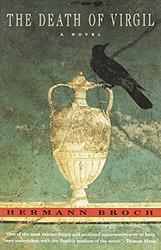Death of Virgil by Hermann Broch
The novel explores the final hours of the Roman poet Virgil, who, while on his deathbed, contemplates the value and impact of his life's work, particularly his unfinished epic, the Aeneid. The narrative is a complex, stream-of-consciousness meditation on art, life, and death, with Virgil wrestling with his desire to burn his epic and the emperor's command to preserve it. The book delves into themes of the meaning of human existence, the role of art in society, and the clash between the individual's inner world and the external world.
The 345th greatest book of all time
Ranking Details:
Our ranking system awards points to books based on their appearance and position on curated lists. Here's how it works:
Unranked Lists: For lists without specific rankings, each book receives points equivalent to the list's weight. This approach recognizes the book's inclusion on prestigious lists.
Ranked Lists: Books on ranked lists receive points in two ways:
- Base Points: Initially, every book is awarded points equal to the list's weight, acknowledging its significance.
- Bonus Points: Additionally, books earn bonus points based on their ranking. The total bonus pool, equal to 100% of the list's weight, is distributed among the books, with higher-ranked books receiving more points.
Exponential Distribution: The distribution of bonus points follows an exponential model. This means the top-ranked book (#1) receives significantly more bonus points than those further down the list (e.g., #100). Our algorithm ensures that higher placements are rewarded more generously, reflecting the achievement of a top rank on any given list.
This scoring system ensures that each book's ranking reflects both its presence on multiple lists and its positions within those lists, providing a comprehensive measure of its acclaim and popularity.
Total Points: 952
Since this book was first published in 1945, there is a penalty of 0%. The age adjusted score is 952.0.
This is to prevent newer books from reaching super high on the ranked list of the greatest books of all time. The greatest books should also stand the test of time.
- score: 144 -- 1001 Books You Must Read Before You Die (Weight: 144)
- score: 142 -- El Pais Favorite Books of 100 Spanish Authors (Weight: 138)
- score: 138 -- Världsbiblioteket (The World Library) (Weight: 138)
- score: 118 -- The 100 Best Novels of the 20th Century (Weight: 114)
- score: 96 -- 1000 Novels Everyone Must Read (Weight: 96)
- score: 90 -- 100 Best Novels, in Translation, Since 1900 (Weight: 87)
- score: 90 -- Our Users' Favorite Books of All Time (Weight: 90)
- score: 81 -- 100 Essential Books (Weight: 81)
- score: 51 -- Harold Bloom's The Western Canon (Weight: 51)

